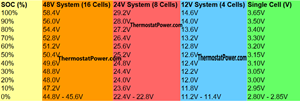The short answer is yes. LiFePO4 batteries do require a charger specifically designed for their unique characteristics. Find below the reasons why.
The Unique Charging Profile of LiFePO4 Batteries
LiFePO4 batteries are different from other battery types like lead-acid and lithium-ion in terms of their voltage and charging profile. While traditional lithium-ion batteries have a nominal voltage of around 3.7V per cell, LiFePO4 cells sit at about 3.2V. Furthermore, their fully charged voltage reaches around 3.6V per cell. This means that the charger used must be able to correctly match these voltages for optimal charging.
Chargers designed for other battery types might not be suitable because they could overcharge or undercharge a LiFePO4 battery. This not only shortens the battery’s life but can also potentially lead to safety hazards. Therefore, using a charger built specifically for LiFePO4 batteries is crucial to maintain their health and performance.
Importance of Charge Voltage Limits
A specialized LiFePO4 battery charger is designed to precisely manage the charging process. For example, a 12V LiFePO4 battery (which consists of 4 cells in series) requires a maximum charge voltage of approximately 14.6V. This is different from lead-acid batteries, which often charge up to 14.8V or more. If you use a standard lead-acid charger, it may push the voltage higher than what the LiFePO4 cells are designed to handle.
Exceeding the safe voltage limit can cause the cells to become unstable, potentially damaging the battery permanently. On the other hand, using a charger that stops charging too soon could leave the battery undercharged, resulting in suboptimal performance. LiFePO4-specific chargers are programmed to adhere to these precise voltage limits, ensuring the battery is neither overcharged nor undercharged.
Watch below what happens if you overcharge a LiFePO4 battery
Current Management for Safe Charging
LiFePO4 batteries have specific current requirements during the charging process. Chargers designed for these batteries typically employ a CC/CV (Constant Current/Constant Voltage) charging algorithm. This means the charger supplies a constant current until the battery reaches a particular voltage, then switches to a constant voltage to safely finish the charge. This method is essential to protect the battery cells from overheating and stress during charging.
Using a generic charger not tailored to the specific needs of LiFePO4 batteries could risk delivering too much or too little current. This could either strain the battery cells, reducing their lifespan, or result in incomplete charging, limiting the battery’s usable capacity.
No Float Charging with LiFePO4 Batteries
One of the main differences between LiFePO4 batteries and lead-acid batteries is how they handle float charging. Lead-acid batteries benefit from a float charge, where the charger continues to supply a small voltage to keep the battery fully charged. However, LiFePO4 batteries do not require, nor do they benefit from, float charging.
In fact, float charging can degrade a LiFePO4 battery over time. Specialized LiFePO4 chargers are designed to stop charging once the battery is full, preventing unnecessary float charging. This off-charging approach helps maximize the battery’s lifespan and performance.
Investing in a dedicated LiFePO4 charger is a small step that ensures you protect your battery investment for the long haul.
